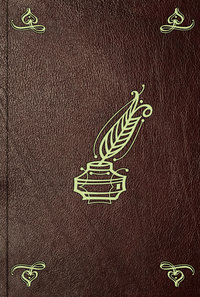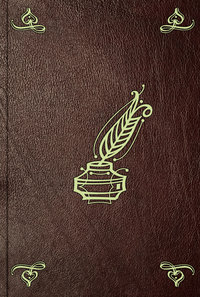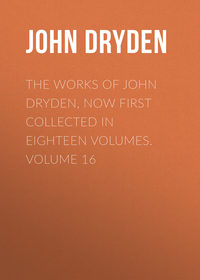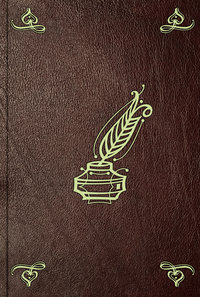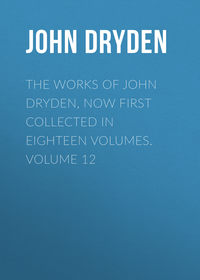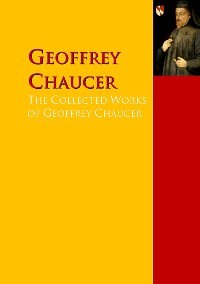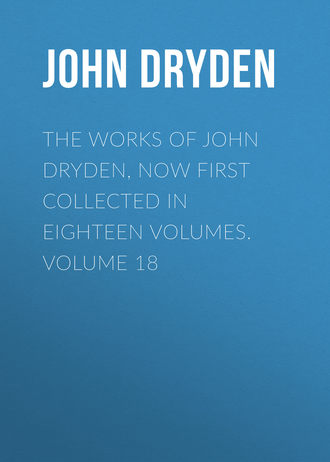 полная версия
полная версияThe Works of John Dryden, now first collected in eighteen volumes. Volume 18
162
The lines alluded to occur in the Epistle to Driden of Chesterton, (Vol. XI. p. 81.) They are very cautiously worded; yet obviously imply, that opposition to government was one quality of a good patriot. Dryden, sensible of the suspicion arising from his politics and religion, seems, in this letter, to deprecate Montague’s displeasure, and to prepossess him in favour of the poem, as inoffensive toward the government. I am afraid, that indemnity was all he had to hope for from the protection of this famed Mæcenas; at least, he returns no thanks for benefits hitherto received; and of these he was no niggard where there was room for them. Pope’s bitter verses on Halifax are well known:
“Dryden alone what wonder came not nigh,Dryden alone escaped his judging eye;Yet still the great have kindness in reserve,He helped to bury, whom he helped to starve.”163
Dryden probably alludes to some expectations through the interest of Halifax, They were never realised; whether from inattention, or on account of his politics and religion, cannot now be known.
164
Charles Hopkins, son of Hopkins, Bishop of Derry, in Ireland. He was educated at Cambridge, and became Bachelor of Arts in 1688; he afterwards bore arms for King William in the Irish wars. In 1694, he published a collection of epistolary poems and translations; and in 1695, “The History of Love,” which last gained him some reputation. Dorset honoured Hopkins with his notice; and Dryden himself is said to have distinguished him from the undergrowth of authors. He was careless both of his health and reputation, and fell a martyr to excess in 1700, aged only thirty-six years. Hopkins wrote three plays, 1. “Pyrrhus, King of Epirus,” 1695; 2. “Boadicea, Queen of Britain,” 1697; 3. “Friendship Improved.” This last is mentioned in the text as to be acted on 7th November.
165
The fate of the Scottish colony at Darien, accelerated by the inhuman proclamations of William, who prohibited his American subjects to afford them assistance, was now nearly decided, and the nation was almost frantic between rage and disappointment. “The most inflammatory publications had been dispersed among the nation, the most violent addresses were presented from the towns and counties, and whosoever ventured to dispute or doubt the utility of Darien, was reputed a public enemy devoted to a hostile and corrupt court.” —Laing’s History, book x.
166
Mr John Driden of Chesterton, member for the county of Huntingdon.
167
Mrs Steward’s father, Mr John Creed, of Oundle.
168
Mrs Thomas, “Curll’s Corinna,” well known as a hack authoress some years after this period, was now commencing her career. She was daughter of Emanuel Thomas, of the Inner Temple, barrister. Her person, as well as her writings, seems to have been dedicated to the service of the public. The story of her having obtained a parcel of Pope’s letters, written in youth, from Henry Cromwell, to whom they were addressed, and selling them to Curll the bookseller, is well known. In that celebrated collection, 2d Vol. 8vo. 1735, the following letters from Dryden also appear. It would seem Corinna had contrived to hook an acquaintance upon the good-natured poet, by the old pretext of sending him two poems for his opinion. She afterwards kept up some communication with his family, which she made the ground of two marvellous stories, one concerning the astrological predictions of the poet, the other respecting the mode of his funeral.
169
“A Pastoral Elegy to the Memory of the Hon. Cecilia Bew,” published afterwards in the Poems of Mrs Thomas, 8vo. 1727.
170
Mrs Catharine Philips, a poetess of the last age. See Vol. XI, p. 111.
171
She lived with her mother, Mrs Elizabeth Thomas, (as we learn from Curll,) in Dyot-street, St Giles’s; but in the first edition of the letter, for the greater honour, she represents it as addressed to herself at Great Russell-street, Bloomsbury.
172
In this lively romance, written to ridicule the doctrines of Rosicrucian philosophy, we are informed, that the Nymphs of water, air, earth, and fire, are anxious to connect themselves with the sages of the human race. I remember nothing about their wish to be baptized; but that desire was extremely strong among the fays, or female genii, of the North, who were anxious to demand it for the children they had by human fathers, as the means of securing to them that immortality which they themselves wanted. Einar Godmund, an ancient priest, informed the learned Torfæus, that they often solicited this favour, (usually in vain,) and were exceedingly incensed at the refusal. He gave an instance of Siward Fostre, who had promised to one of these fays, that if she bore him a child, he would cause it to be christened. In due time she appeared, and laid the child on the wall of the church-yard, with a chalice of gold and a rich cope, as an offering at the ceremony. But Siward, ashamed of his extraordinary intrigue, refused to acknowledge the child, which, therefore, remained unbaptized. The incensed mother re-appeared and carried off the infant and the chalice, leaving behind the cope, fragments of which were still preserved. But she failed not to inflict upon Siward and his descendants, to the ninth generation, a peculiar disorder, with which they were long afflicted. Other stories to the same purpose are told by Torfæus in his preface to the “History of Hrolf Kraka,” 12mo. 1715. I suppose, however, that Dryden only recollected the practice of magicians, who, on invoking astral spirits, and binding them to their service, usually imposed on them some distinguishing name. It is possible Paracelsus says something to the purpose in his Magna Philosophia.
173
In printing this letter, Mr Malone says, he “followed a transcript which he made some years ago from the original. It is preserved in a small volume in the Bodleian Library, consisting chiefly of Pope’s original Letters to Henry Cromwell, which Mrs Thomas sold to Curll, the bookseller, who published them unfaithfully. It afterwards fell into the hands of Dr Richard Rawlinson, by whom it was bequeathed to that Library.”
174
Afra Behn, whose plays, poems, and novels, are very indecent; yet an aged lady, a relation of the editor, assured him, that, in the polite society of her youth, in which she held a distinguished place, these books were accounted proper reading; and added, with some humour, it was not till after a long interval, when she looked into them, at the age of seventy, that she was shocked at their indecorum.
175
The Pastoral Elegy on Mrs Bew, and the Triple League.
176
Colonel Codrington wrote an epilogue to Dennis’ “Iphigenia.” Dryden here talks rather slightingly of his acquaintance; but “Iphigenia” is a most miserable piece.
177
Mary, the daughter of Henry Mordaunt, the second Earl of Peterborough, and wife of Thomas, the seventh Duke of Norfolk, afterwards divorced for criminal conversation with Sir John Germaine. See the Proceedings in the State Trials.
178
The Right Hon. Charles Montague.
179
He was about a year after created Lord Halifax.
180
Lord Somers. – Mr Malone is of opinion, that this passage adds some support to what has been suggested in our author’s Life, that a part of Dryden’s “Satire to his Muse” was written in his younger days by this great man. Yet I cannot think, that great man would be concerned in so libellous a piece: and in the same breath Dryden tells us, that he hoped Montague, who had really written against him, was much his friend.
181
Erasmus Dryden, who lived in King’s-street, Westminster, and was a grocer. In Dec. 1710, he succeeded to the title of Baronet.
182
Jemima, Mrs Steward’s youngest daughter, probably then four or five years old.
183
“Fables Ancient and Modern.”
184
Elmes Steward, Esq., was appointed sheriff of the county of Northampton in Nov. 1699.
185
Dennis’s “Iphigenia” was performed at the theatre in Little Lincoln’s Fields; and “Achilles, or Iphigenia in Aulis,” written by Abel Boyer, and, if we are to believe the author, corrected by Dryden, was acted at the theatre in Drury-Lane. Dennis says in his Preface, that the success of his play was “neither despicable, nor extraordinary;” but Gildon, in his “Comparison between the two Stages,” 8vo, 1702, informs us, that it was acted but six times; and that the other tragedy, after four representations, was laid aside. Malone.
186
In the London Gazette, No. 3557, Thursday, December 14, 1699, it is mentioned, that a proclamation for preventing and punishing immorality and profaneness, had been issued out on the 11th instant. We know, by the experience of our own time, the justice of Dryden’s observation.
187
Not at St James’ Church, but at the Chapel Royal. The pews, it seems, were raised to prevent the devotions of the maids of honour from any distractions in time of service. But the ballad maliciously supposes, that the intention was to confine the sun-beams of their eyes to the preacher, Bishop Burnet. The ballad itself may be found Vol. X. p. 270.
188
This poem is a banter upon the interest which the nobility took in the disputes between the Dury-Lane theatre, where Skipwith was manager, and that in Lincoln’s Inn Fields, of which Betterton was sovereign. The “Island Princess” of Fletcher had been converted into a sort of opera, by Peter Motteux, and acted at Drury-Lane in 1699. The peculiar taste of Rich for every thing that respected show and machinery is well known.
189
Alluding to the statutes imposing the oath of allegiance and supremacy on all Catholics, under the penalty of incapacity to hold landed property. 11 and 12 William III. cap. 4.
190
The excellent comedy entitled the “Way of the World.” It had cost Congreve much pains, and he was so much disgusted with the cold reception alluded to in the text, that he never again wrote for the stage.
191
His Fables.
192
King William had made large grants of land out of the forfeited estates in Ireland, to his foreign servants, Portland, Albemarle, Rochford, Galway, and Athlone, and to his favourite, Lady Orkney. The Commons, who now watched every step of their deliverer with bitter jealousy, appointed a commission to enquire into the value of these grants; and followed it with a bill for resuming and applying them to the payment of public debt; “and; in order to prevent the bill from being defeated in the House of Lords, they, by a form seldom used, and which very seldom should be used, tacked it to their bill of supply; so that the Lords could not refuse the one, without disappointing the other. The Lords, to secure themselves from that insignificancy, to which the form of the bill tended to reduce them, disputed, in some conferences with the Commons, the form of it with warmth; but the resumption which it contained with indifference. And in both Houses, even the servants of the Crown gave themselves little trouble to defeat it; partly to gain popularity, but more from national antipathy to foreigners, and envy at gifts in which themselves were no sharers. The King, making allowances for national weaknesses, and for those of human nature, passed the bill without any complaint in public, but with a generous indignation in private, which perhaps made the blow fall more heavy on his friends, when, in order to soften it, he said to them, that it was for his sake, and not for their own, they were suffering,” —Dalrymple’s Annals. William felt so deeply the unkindness offered to him, that he prorogued the Parliament without the usual ceremony of a speech from the throne.
193
Mr Steward.
194
More commonly called Vanbrugh. In Dryden’s age, the spelling of proper names was not punctiliously adhered to.
195
Dryden died on the 1st of May, and this letter was written on the 11th of the preceding month. The prologue and epilogue were therefore composed within less than a month of his death.
196
Mr Malone doubts his being Doctor.
197
Thomas.
198
Sir Richard Philipps, according to Collins.
199
Sir Edward Hartop, says Collins.
200
Susanna, the wife of Sir John Pickering, according to Collins, was the eldest daughter of Sir Erasmus Driden.
201
Erasmus Driden, the poet’s father, was the writer’s great uncle. All these corrections are made by Mr Malone.
202
Ego sum Preceptor Amoris. Art. Am. Lib.
203
His Ode on St Cecilia’s Day, entitled, Alexander’s Feast, or the Power of Music.
204
Mrs Philips.
205
Mrs Behn.
206
Sir Thomas Skipwith, joint patentee and manager with Charles Rich of the Drury-Lane theatre.
207
Mary Tudor, natural daughter of Charles the Second, and lady of Lord Ratcliff, (now Earl of Derwentwater,) to whom Dryden dedicated his Third Miscellany. See Vol. XII. p. 47.
208
Arabella, daughter of Sir Edward Allen, Bart. She first married Francis Thompson, Esq. and was at this time the wife of Lord George Howard, (eldest son of Henry, the sixth duke of Norfolk, by his second wife,) who died in March 1720-21. Malone.
209
Elizabeth, daughter of Digby, Lord Gerard, and second wife of James, Duke of Hamilton, who was killed in a duel by Lord Mohun, in November 1712. Malone.
210
Elizabeth, daughter of Charles Bertie of Uffington, in the county of Lincoln, Esq. a younger son of Montague, the second earl of Lindsey. She was at this time the wife of Charles Mildmay, the second Lord Fitzwalter of that family. Malone.
211
Margaret, daughter of George, Lord Chandos, and relict of William Brownlow of Humby, in Lincolnshire.
212
Richard Norton of Southwick, in Hampshire, Esq. Cibber’s comedy, entitled, “Love’s last Shift,” was dedicated to this gentleman, in February 1696-7. Mr Norton died December 10, 1732, in his sixty-ninth year.
213
Anthony Henley, of the Grange, in Hampshire, Esq., a man of parts and learning, and a correspondent of Swift, who died in 1711.
214
Perhaps General Webbe, whose “firm platoon” was afterwards celebrated by Tickell. Of the prowess of Mr Beereton no memorials have been discovered. Malone.
215
Lord Henry Scott, second surviving son of James, Duke of Monmouth, who was born in 1676. In 1706 he was created Earl of Deloraine; and died about 1730.
216
The Earl of Derwentwater’s poetry, which, according to Dryden, was none of the best.
217
The famous Betterton, who, in 1695, again divided the two companies, and headed that in Lincoln’s Inn Fields.
218
Robert, third Earl of Scarsdale, a protector of Betterton’s company.


